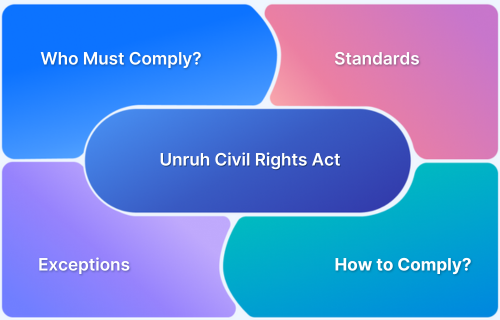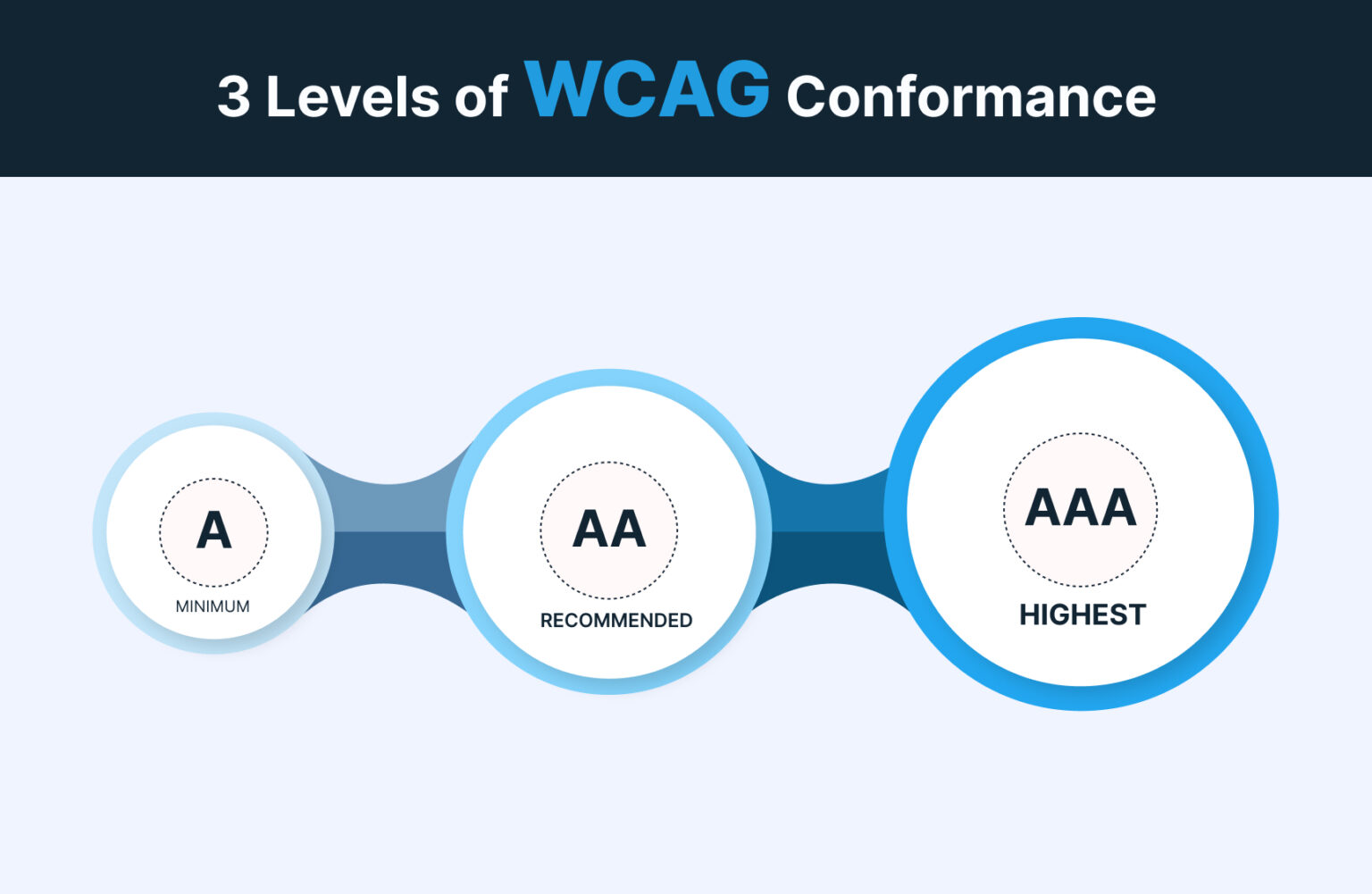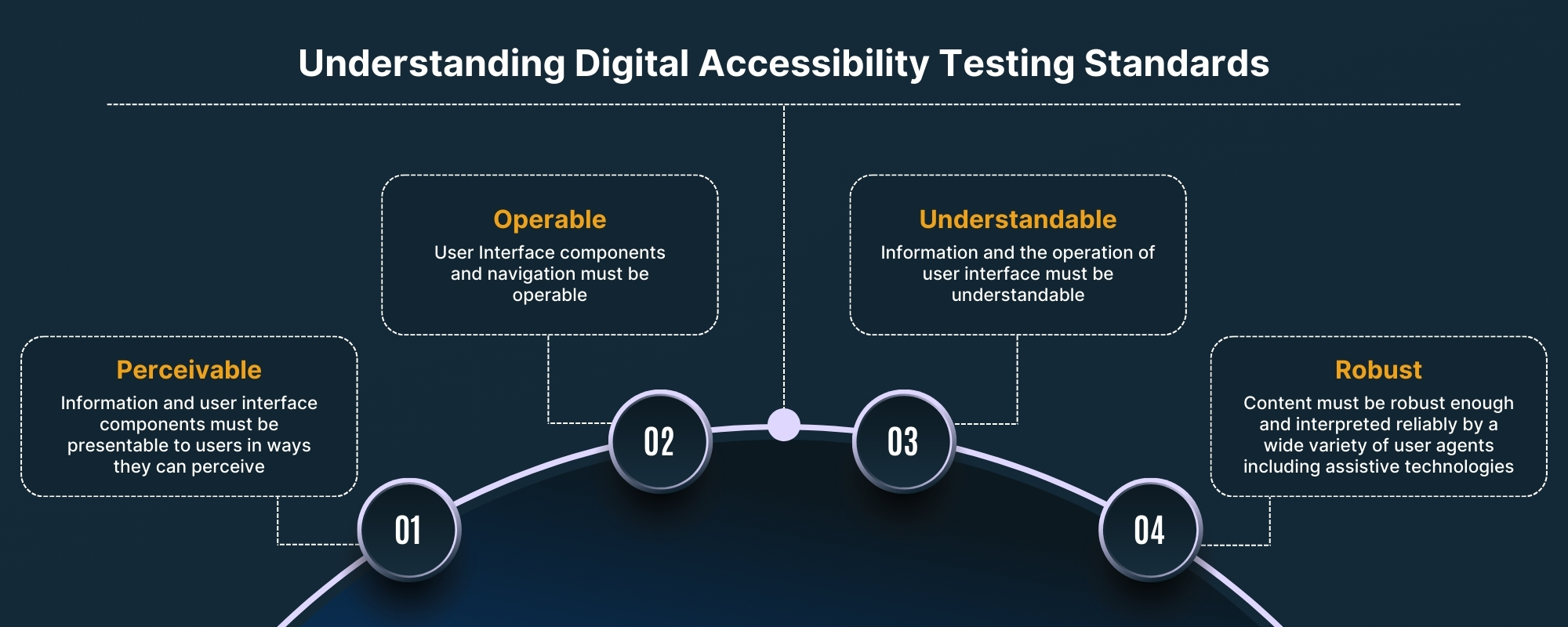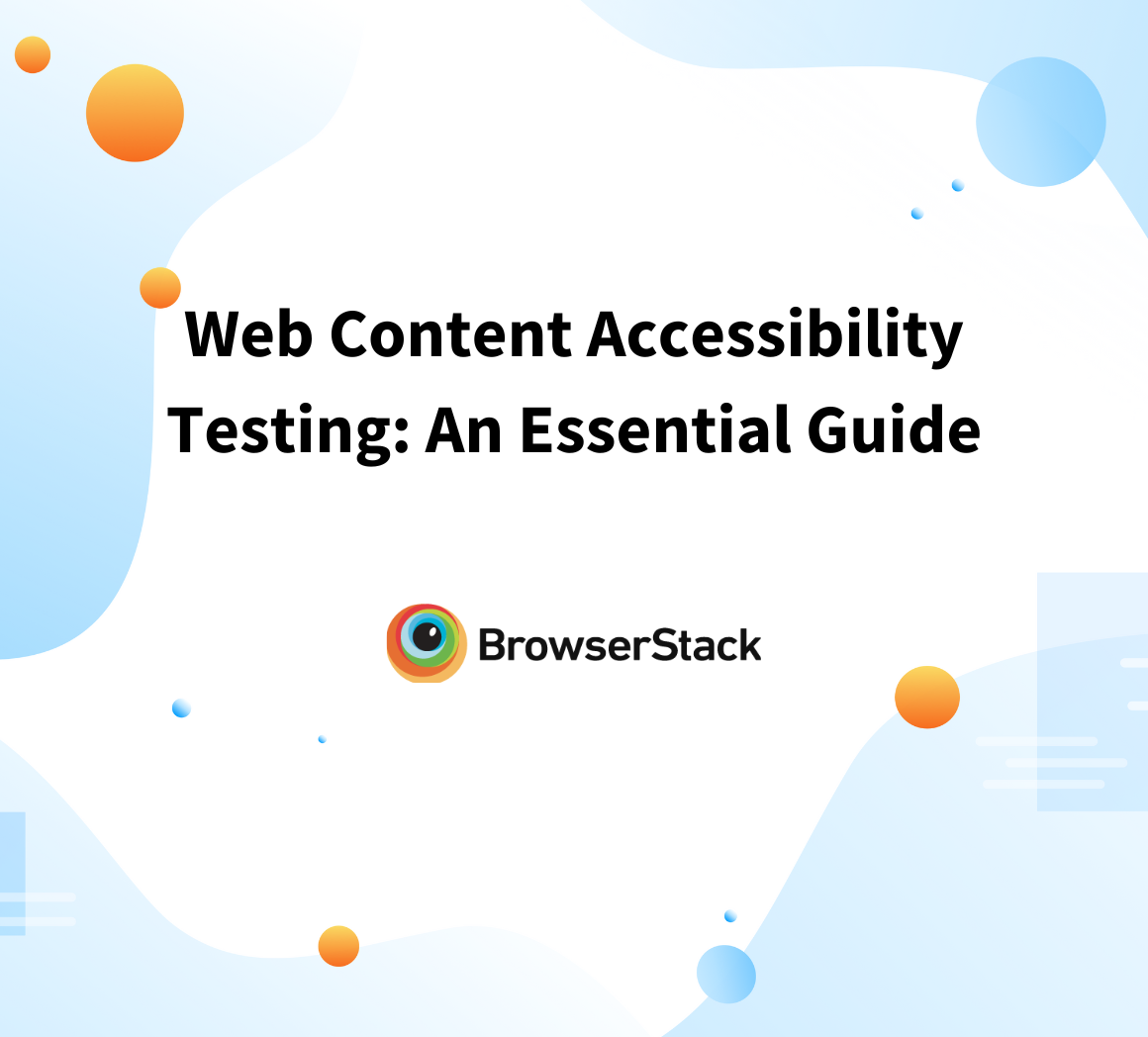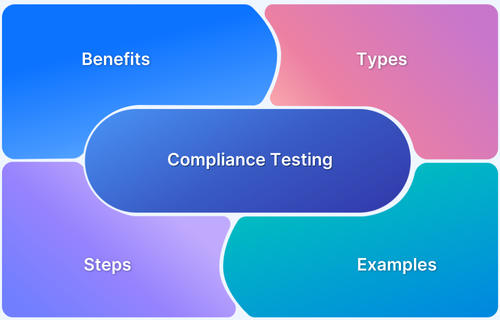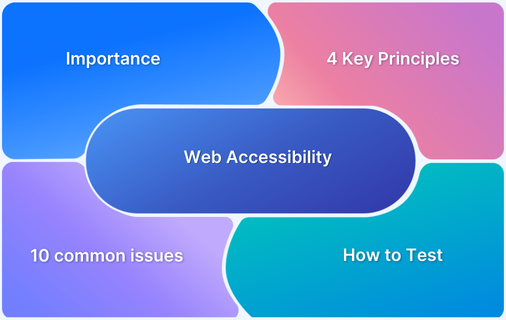The Unruh Civil Rights Act prohibits website discrimination and ensures equal access for individuals with disabilities. All businesses in California must ensure accessibility in both physical and digital spaces.
Overview
What is the Unruh Act?
The Unruh Civil Rights Act (California Civil Code § 51) is a state law that prohibits discrimination in business establishments based on disability, race, age, sex, religion, sexual orientation, and other protected characteristics. It works alongside the Americans with Disabilities Act (ADA) and complements California’s Disabled Persons Act (CDPA) to ensure equal access to businesses and services.
How Does the Unruh Act Apply to Websites?
The Unruh Act requires websites to be accessible to everyone, including individuals with disabilities, as interpreted under ADA requirements. Courts often assess compliance with the Unruh Act using WCAG 2.1 guidelines, which set standards for text alternatives, keyboard navigation, and screen reader compatibility.
How does the Unruh Act Relate to Accessibility?
The Unruh Act prohibits discrimination and extends to digital spaces by requiring businesses to ensure accessibility for individuals with disabilities. It incorporates ADA requirements, so violations of ADA standards directly violate the Unruh Act. Non-compliance can result in $4,000 in statutory damages per violation.
This article explains the Unruh Civil Rights Act, who it applies to, its exceptions, and steps to make your website compliant.
What is the Unruh Civil Rights Act?
The Unruh Civil Rights Act is a California law that prohibits discrimination in businesses, including websites and digital services. Passed in 1959 and named after Senator Jesse Unruh, it ensures equal access for all individuals and protects against discrimination based on disability, race, religion, and other characteristics.
Businesses in California must ensure website accessibility under the ADA since the Unruh Act treats ADA violations as automatic violations. Courts have upheld this by referencing WCAG 2.1 (Level AA) and the ADA as compliance standards.
- Robles v. Domino’s Pizza (2019): The 9th Circuit Court of Appeals ruled that Domino’s website and mobile app must be accessible under the ADA and, by extension, the Unruh Act.
- Thurston v. Midvale Corporation (2019): A California court found that a restaurant’s website was not accessible to blind users and, therefore, violated both the ADA and the Unruh Act.
- Bashin v. Conduent, Inc. (2023): A lawsuit was filed under the Unruh Act and the California False Claims Act after a state contractor failed to make California’s Parks Department reservations website accessible to blind users. The case settled for $2 million in November 2023.
Who Does the Unruh Civil Rights Act Apply To?
The Act applies to all businesses in California, including digital platforms, that offer goods, services, or accommodations. Companies must comply with the Unruh Act regardless of size or industry, and failure to ensure accessibility can lead to legal action and penalties.
This includes:
- Hotels, restaurants, and theaters
- Retail stores and shopping centers
- Hospitals, medical clinics, and dental offices
- Banks and financial institutions
- Government agencies and public-facing services
- Other websites that provide services to California residents
Unruh Compliance Standards
The Unruh Act does not specify technical standards but incorporates ADA requirements, which are commonly aligned with WCAG 2.1 guidelines.
Read More: Website Accessibility Checklist
WCAG outlines three levels of compliance:
- Level A: Basic accessibility requirements.
- Level AA: Considered the standard for accessible digital experiences.
- Level AAA: The highest level of accessibility requirements.
Though not legally mandated, WCAG 2.1 Level AA is commonly referenced in legal cases as a benchmark for compliance. Businesses looking to minimize legal risks and create an inclusive experience should meet these standards.
Read More: What is Compliance Testing?
Unruh Act vs. ADA: Major Differences
The Unruh Act incorporates ADA violations as automatic violations and requires businesses in California to comply with ADA accessibility standards, including digital accessibility. However, the two laws differ in scope, enforcement, and legal protections.
| Parameter | Unruh Act | ADA (Americans with Disabilities Act) |
|---|---|---|
| Scope | State law, applies only in California | Federal law, applies across the United States |
| Focus | Protects against various forms of discrimination, including race, gender, religion, disability, and more | Ensures accessibility and non-discrimination specifically for individuals with disabilities |
| Coverage | Broad protection across multiple characteristics | Primarily focuses on disability discrimination |
| Who Must Comply | Any business operating in California, including those with a physical or digital presence | Businesses, public entities, and employers across the U.S. |
| Legal Penalties | Minimum statutory damages of $4,000 per violation | Injunctive relief, civil penalties, and attorney fees |
| Intent Requirement | Discrimination claims can be filed even without proof of intent | Plaintiffs must generally prove intentional discrimination |
| Digital Accessibility Standard | Often references WCAG 2.1 Level AA for web accessibility | There is no explicit technical standard, but WCAG is commonly used in legal cases |
| Lawsuit Basis | Can be filed for any form of discrimination, including disability | Primarily focuses on disability-related barriers |
Exceptions to the Unruh Act
While the Unruh Civil Rights Act generally forbids discrimination by California corporations, there are some exceptions.
- Religious Institutions: Churches, synagogues, and other places of worship are excluded unless they operate public-facing businesses, such as a daycare or thrift store.
- Private Clubs: Membership-based private clubs that are selective and not open to the public are typically exempt. However, services provided to non-members, such as event rentals, must adhere to the Unruh Act.
- Nonprofit organizations: Nonprofits may be exempt if they do not operate as businesses. However, if they offer goods or services to the public, such as fundraising events or product sales, they must comply with the Unruh Act.
- Bona Fide Occupational Qualification (BFOQ): Employers may impose specific job qualifications based on characteristics like age or gender only if they are essential to the role (e.g., hiring only female caregivers in a women’s shelter).
- Reasonable Business Standards: Businesses can enforce practical policies, such as age restrictions for purchasing alcohol or dress codes for safety, as long as they are applied fairly and do not result in unlawful discrimination.
What Are the Costs Associated With Non-Compliance?
Non-compliance with the Unruh Civil Rights Act can have serious financial and reputational ramifications for enterprises.
- Statutory Damages: The Unruh Act does impose a minimum of $4,000 per violation, but courts may reduce or waive damages in some cases if the defendant took proactive measures to improve accessibility.
- Attorney’s Fees and Court Costs: Plaintiffs are entitled to collect legal and court fees, which significantly increases the financial burden on non-compliant businesses.
- Additional Damages: Plaintiffs may seek additional damages for emotional anguish or harm caused by discrimination, including punitive damages intended to punish the perpetrator.
- Injunctive Relief: A court may order businesses to stop discriminatory practices and implement accessibility improvements, often at a high cost.
- Lost Licensing: In extreme cases, regulatory agencies may impose penalties or suspend business licenses for repeated violations.
- Reputational Damage: Negative publicity from lawsuits can undermine customer trust, hurt brand reputation, and result in long-term economic losses.
How to Ensure Your Website is ADA-compliant?
Follow these steps to make your website ADA-compliant and, by extension, Unruh-compliant.
- Adhere to WCAG Guidelines: Use the WCAG checklist and prioritize Level AA compliance to remove accessibility barriers. Ensure your website is perceivable, operable, understandable, and robust.
- Use Alt Text for Visuals: Provide descriptive alternative text (alt text) for all images, graphics, and visual elements to ensure accessibility for screen readers and visually impaired users.
- Ensure Keyboard Navigation: To accommodate users who cannot use a mouse, make all interactive elements, such as buttons, forms, and menus, fully accessible via keyboard navigation.
- Maintain Proper Color Contrast: Use high-contrast color combinations between text and backgrounds to ensure readability for users with low vision or color blindness.
- Add Captions and Transcripts: To make multimedia accessible to users with hearing impairments or those using assistive devices, include captions for videos and transcripts for audio content.
- Conduct Accessibility Testing: Regularly test your website using automated tools and real-user testing to identify and fix accessibility issues before they affect users.
Read More: How to Automate Accessibility Testing
Ensuring ADA compliance can be complex, but BrowserStack Accessibility simplifies the process with robust testing, monitoring, and automation tools. It offers the necessary features to comply with ADA and WCAG standards and ensures compliance with the Unruh Act.
- Scan and Monitor: Detect accessibility barriers early with automated scans to prevent legal risks and ensure a smooth user experience.
- Workflow Analyzer: Identify critical issues like missing alt text and low contrast across multiple web pages in a single scan.
- Real Device Screen Reader Testing: Validate accessibility on real devices using VoiceOver, NVDA, and TalkBack.
- Test Automation: Seamlessly integrate accessibility checks into your existing test suite for continuous compliance.
- Precisely Locate Issue Sources: Use test workflow logs to pinpoint where accessibility issues occur for faster troubleshooting and resolution.
Conclusion
The Unruh Civil Rights Act expands ADA standards to websites and online services and ensures stronger digital accessibility protections in California. All businesses, including online retailers, service providers, and subscription-based platforms, must comply with these requirements to avoid legal risks and penalties.
BrowserStack Accessibility makes it easier to ensure compliance with advanced testing that detects WCAG violations across websites and gated pages. You get instant access to assistive tools on real devices like VoiceOver, NVDA, and Talkback to evaluate website usability with screen readers. The central reporting dashboard offers detailed issue summaries to help you debug more efficiently.
Frequently Asked Questions
1. Who can be sued under the Unruh Act?
Any business operating in California or serving its consumers can be sued under the Unruh Act for website inaccessibility if there is clear evidence of intentional or arbitrary discrimination. This also applies to out-of-state companies.
